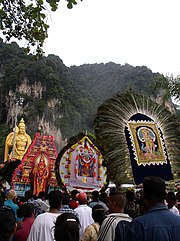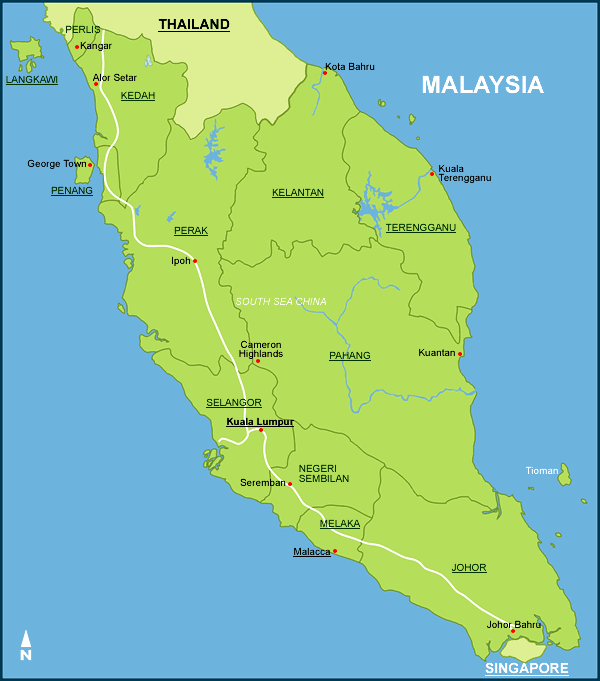Hinduism in Malaysia
From Wikipedia, the free encyclopedia
Hinduism is a minority religion in Malaysia. An estimated 9% of the total population of Malaysia are ethnic Indians, of whom almost 89% are practicing Hinduism. Most of the ethnic Indians are Tamils from the south Indian state of Tamil Nadu.
Contents |
History
Hinduism was prevalent in Malaysia prior to the arrival of Islam in the 15th century. Traces of Hindu influence remain in the Malay language, literature and art.Indian settlers came to Malaysia from Tamil Nadu in the late 19th and early 20th centuries. Many of these came to work as labourers on rubber plantations, while those who were English-educated occupied more professional positions. A minority of Indian immigrants to Malaysia during this time period came from Northern India and Sri Lanka.
Culture
Malaysian Hinduism is diverse, with large urban temples dedicated to specific deities, and smaller temples located on estates. The estate temples generally follow the tradition of the Indian region from which the temples' worshippers originate. Many people follow the Shaivite, or Saivite, tradition (worship of Shiva), of Southern India. However, there are also some Vaishnava Hindus in Malaysia as well, many of them of North Indian extraction, and these Hindus worship in temples such as the Geeta Ashram in Seksyen 52, Petaling Jaya, or the Lakshmi-Narayan Temple in Kampung Kasipillay, Kuala Lumpur. Services in these temples are usually conducted in Hindi and English.Folk Hinduism is the most prevalent variety, including spiritualism and worship of local gods.
The International Society for Krishna Consciousness also has a number of followers in Malaysia, and maintains temples in Kuala Lumpur, Penang, Taiping and Seremban. The Ratha-Yatra festival is held once a year, when the Deities of Lord Jagannath, Baladeva and Subhadra are placed on a chariot which is pulled through the streets by devotees, accompanied by a party chanting the Hare Krishna Mahamantra.
There are also few devotees of Sri vaishnava(Ramanucharya)and Madhva Sampradayaa.. There are also a few followers of Sai Baba
Since the Second World War a revival of Hinduism has occurred among Indian Malaysians, with the foundation of organisations and councils to bring unity or to promote reform.
Hindu religious festivals
Some of the major Hindu festivals celebrated every year include Deepavali, Thaipusam.
Persecution
Between April to May 2006, several Hindu temples were demolished by city hall authorities in the country. On April 21, 2006, the centuries old Malaimel Sri Selva Kaliamman Temple in Kuala Lumpur was reduced to rubble after the city government sent in bulldozers ostensibly because of a violation of construction laws.The president of the Consumers Association of Subang and Shah Alam in Selangor State has been helping to organize efforts to stop the local authorities in the Muslim dominated city of Shah Alam from demolishing a 17-year-old Hindu temple. The growing Islamic conservatism in Malaysia concerns many Malaysians who follow minority religions such as Hinduism.
Many Hindu advocacy groups have protested what they allege is a systemic plan of Temple cleansing in Malaysia. The official reason given by the Malaysian government has been that the temples were built "illegally." However, several of the temples were centuries old and predated many mosques which do not receive the same treatment.
On May 11, 2006, armed city hall officers from Kuala Lumpur forcefully demolished part of a 90-year-old suburban temple that serves more than 3,000 Hindus. The "Hindu Rights Action Force," or HINDRAF a coalition of several NGO's, have protested these demolitions by lodging complaints to the Malaysian Prime Minister . Their chairman, Waytha Moorthy Ponnusamy, said:
“These state atrocities are committed against the most underprivileged and powerless sector of the Hindu society in Malaysia. We appeal that this Hindu temple and all other Hindu temples in Malaysia are not indiscriminately and unlawfully demolished,”.In 2007, Malaysian Hindu organizations protested the destruction of Hindu temples by the Malaysian regime. On October 30, 2007 the 100-year-old Maha Mariamman Temple in Padang Jawa was demolished by Malaysian authorities. Following that demolition, Works Minister and head of the Malaysian Indian Congress Samy Vellu, who is of Indian origin, said that Hindu temples built on government land were still being demolished despite his appeals to the various state chief ministers.
Such temple destructions in Malaysia have been reported by the Hindu American Foundation.
HAF notes that the Government of Malaysia Restricts Freedom of Peaceful Assembly and Association contrary to Article 20 of the Universal Declaration of Human Rights (1948) and Article 10 of the Malaysian Federal Constitution, and that the application filed by Malay Hindus to hold gatherings have been arbitrarily denied by the police. The Government has also tried to suppress a campaign launched by an NGO, the Hindu Rights Action Force (HINDRAF) to obtain 100,000 signatures in support of a civil suit against the Government of United Kingdom. HINDRAF has accused the Malaysian government of intimidating and instilling fear in the Indian community.
The Hindraf rally prompted the Malaysian government to open dialogue with various Indian and Hindu organizations like the Malaysia Hindu Council, Malaysia Hindudharma Mamandram, and Malaysian Indian Youth Council (MIYC) to address the misgivings of the Indian community. HINDRAF itself has been exluded from these talks and no significant changes have resulted from the discussions.
References
See also
- List of Hindu temples all over the world
External links
- Malaysia's clash of cultures
- dbkl-smashed-statues-of-hindu-gods blog
- 100-yr-old Hindu temple razed in KL
- Video of Hindu temple demolition in Malaysia
- New religious dispute sparks fears of rising Islamization in Malaysia
- Malaysia 'convert' claims cruelty
- Malaysia Hindu activists arrested
- Malaysia Hindu activists released
- Scores charged over Hindu rally
- Malaysia court rejects Hindu bid
- Detentions over Malaysian Hindu rally
- Malaysia burial row fuels tension
- Protesters threaten bloodshed over Hindu temple
- http://www.mamandram.org/
- http://www.hindusangam.org.my/
- http://www.hinduyouth.com.my/


















No comments:
Post a Comment